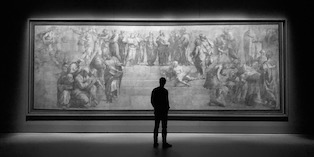Podcast Profile: Peter Westmoreland Podcast
 Site • RSS • Apple Podcasts
Site • RSS • Apple Podcasts30 episodes
2024
Median: 43 minutes
Collection: Philosophy

 Site • RSS • Apple Podcasts
Site • RSS • Apple PodcastsDescription (podcaster-provided):
Host Peter Westmoreland entertains philosophy and pop culture ideas with guests and friends.Themes and summary (AI-generated based on podcaster-provided show and episode descriptions):
➤ 1990s pop culture through philosophy • authenticity, memory, time, humor, postmodernism • sex, AIDS, feminism, epistemic violence • science, climate change, technology, place, neoliberalism • music, punk, comedy, sports, Orlando, scandalsThis podcast blends philosophy with pop culture through conversations with guests and reflective monologues, using the 1990s as a recurring lens for examining ideas, events, and everyday life. Across the episodes, the host connects academic concepts—such as authenticity, ethics, epistemology, time consciousness, humor, and the philosophy of place—to familiar cultural touchstones from the decade, including music scenes, film, television, video games, professional wrestling, and celebrity news. The result is an exploration of how people form values and identities through culture, memory, and nostalgia, and how stories about “the 90s” shape what we think we know about the past.
A prominent throughline is the tension between sincerity and commercialization: discussions of “selling out,” DIY subcultures, and the pressures that push countercultural values into the mainstream. Another theme is how institutions and power affect whose experiences are heard and trusted, with attention to feminism, public controversies, and the idea of epistemic injustice or “epistemic violence.” The show also revisits major social and political currents associated with the era—HIV/AIDS and sexual culture, scandals and media spectacle, and the atmosphere of optimism and anxiety that surrounded technology, economics, and globalization.
Interviews broaden the scope by bringing in writers, philosophers, scientists, planners, and journalists to talk about their work and their experience of the decade. These conversations range from music criticism and comedy to urban design, climate science, and financial wrongdoing, often tying personal stories to larger questions about methodology, evidence, and interpretation. Live and audience-question formats appear as well, emphasizing dialogue and debate. Overall, the podcast uses the 1990s less as a strict history lesson than as a case study for thinking philosophically about culture, knowledge, and the ways people make meaning out of the recent past.